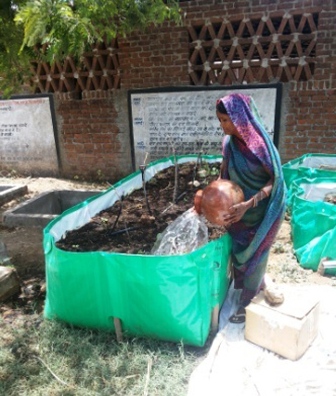A green enterprise led by women transforms waste to wealth in Bundelkhand
 It may seem difficult to believe that kitchen waste such as fruit and vegetable peels, bread crumbs, broken egg shells etc. can create wealth. But the fact is that kitchen waste can be recycled through vermicomposting to create wealth of rich and fertile soil. Excessive use of agro-chemicals like pesticides and fertilizers affect quality of soil; reduce crop yields, quality of products and cause various types of health hazards. A natural balance needs to be maintained at all cost for existence of life and property. Organic farming is the key to achieving agricultural sustainability. Vermicomposting is one of the most important components of organic farming and also a remunerative enterprise for the farmers. It is also ideal for city dwellers, looking to take their greening efforts to the next level.
It may seem difficult to believe that kitchen waste such as fruit and vegetable peels, bread crumbs, broken egg shells etc. can create wealth. But the fact is that kitchen waste can be recycled through vermicomposting to create wealth of rich and fertile soil. Excessive use of agro-chemicals like pesticides and fertilizers affect quality of soil; reduce crop yields, quality of products and cause various types of health hazards. A natural balance needs to be maintained at all cost for existence of life and property. Organic farming is the key to achieving agricultural sustainability. Vermicomposting is one of the most important components of organic farming and also a remunerative enterprise for the farmers. It is also ideal for city dwellers, looking to take their greening efforts to the next level.
Earthworms are used to convert organic waste into vermicompost; nutritive ‘organic fertiliser’ rich in humus, micronutrients. Earthworms consume all kinds of organic wastes under conducive conditions; including kitchen waste, animal waste, agricultural residues and even paper. They restore, improve soil fertility and significantly boost crop productivity. Both earthworms and its vermicompost & body liquid are scientifically proven as both ‘growth promoters & protectors’ for crop plants. A judicious use of organic waste; improves soil health, facilitates soil aeration and aids more efficient water holding capacity of the soil.
In order to enhance the income earning capacity of women, as well as to promote natural resource management and sustainable farming; Development Alternatives re-looked at the farming techniques for production of more eco-friendly and healthy farm products. Supported by Development Alternatives, a women led federation – Sankalp Swashakti Mahila Mandal has demonstrated how low-cost technology can be easily used for transforming waste to wealth for community. The women federation produces vermicompost in the form of tetra vermi bed. These tetra vermi beds are low cost, easy to adopt and implement, require very little space and produce good quality organic manure, which can be used in farm lands, nurseries and even backyard gardens.
As animal or agriculture waste are the only raw material used for vermicomposting, there is very little investment cost involved; as a result profit margins are high. Members of the women federation have also been trained to engage in value chain development—production and marketing of their products. Sankalp Swashakti Mahila Mandal has built institutional linkages for marketing of the vermicompost, which is bought by various nursery owners, orchard farmers for their guava, amla (gooseberry), mango plantations. This low cost model of income generation serves the dual purpose of boosting the rural economy, as well as promoting sustainable food production in various fruit and vegetable plantations in Bundelkhand region (Central India). It has helped women to set up micro-enterprises based on vermi-culture technology in rural and peri-urban areas of Bundelkhand and has improved their economic and social status. Women play a crucial role in decision-making regarding marketing / selling of the produce, which shows a transition in the otherwise patriarchal society of Bundelkhand.
It has also promoted the use of waste recycling in the village. This in turn has reduced the amount of waste strewn in the village. It has enhanced soil fertility and food productivity, through ecological methods of farming, including organic nutrient recycling. This green enterprise is also being replicated in Jhansi, Lalitpur, Banda, and Tikamgarh district of Bundelkhand region. A total of 120 Vermicompost units have been producing approximately 10 tonnes of organic manure per cycle (one cycle is of 45-60 days) q
.
Omkar Gupta
ogupta@devalt.org
The views expressed in the article are those of the author’s and not necessarily those of Development Alternatives.



Leave a Reply